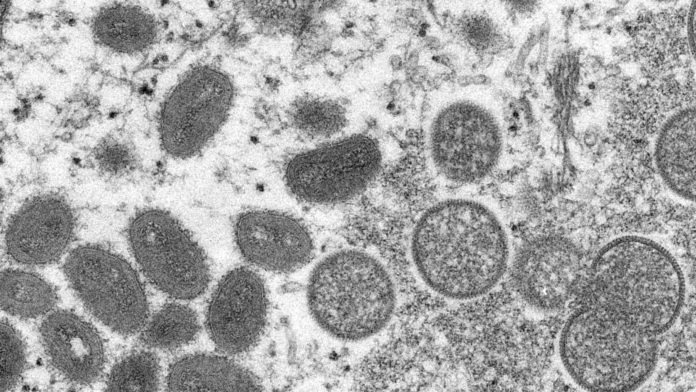
Four more presumptive monkeypox cases related to travel between states and unrelated to previously reported cases in Sacramento County have been detected, health officials said on Wednesday. With the total case count rising to 14, health officials are expanding eligibility for monkeypox vaccination beyond those who are a close contact of someone infected. The risk to the general public is low, but people at high risk of getting the virus should get vaccinated, Sacramento County Public Health officials said. (Previous coverage in video above.)That category now includes men who have sex with men and, or, transgender people who meet at least one of the following criteria: Have tested positive for an STI in the past two monthsHad two or more sexual partners in the last three weeksAttended or work at a commercial sex venue in the last three weeksHad anonymous sex in the past three weeksEngaged in transactional sex work in the past three weeksThe expanded guidance for who should be vaccinated comes after the county previously offered the vaccine to people who are in close contact with those infected. “We are encouraging those who meet high-risk criteria to get vaccinated in hopes of preventing additional Monkeypox cases,” Public Health Officer Dr. Olivia Kasirye said.Those who are interested in getting the vaccine can call 916-875-7468 to schedule an appointment. Health officials stress that while some people are at higher risk of getting the virus, anyone can contract it through any kind of physical contact. The Centers for Disease Control and Prevention says that officials are concerned that focusing on cases involving gay and bisexual men “may stigmatize this population and create a false sense of safety among those who are not gay and bisexual men.”On Tuesday, Sacramento County reported two more probable cases. It had been at least a couple of weeks since the last case was confirmed. The California Department of Public Health said there are a total of 186 probable and confirmed cases in the state as of July 12 at 2 p.m.As of Wednesday, the CDC reported 1,053 cases of monkeypox or orthopoxvirus, the family of viruses that include monkeypox, across most states as well as Washington, D.C. There were 84 cases on June 16. Worldwide, there are more than 10,000 cases as of July 12. Learn more here.Monkeypox symptoms include fever, headache, muscle aches, backache, swollen lymph nodes chills, and exhaustion. The patient can also develop a rash days later that often begins in the face and spreads to other parts of the body. It can cause lesions. The illness can last anywhere from two to four weeks. Some people only develop the rash as their first symptom.Monkeypox virus can be transmitted when a person comes into contact with an animal, human or materials like clothing or bedding contaminated with the virus. The virus can enter the body through the broken skin of a lesion, respiratory tract, or mucous membranes, which include the eyes, mouth and nose.Health experts have also said that it is possible, in rare cases, to get monkeypox through the inhalation of droplets.The incubation period is usually one to two weeks but can range from 5-15 days, according to Sacramento County health officials. The illness lasts for two to four week.Monkeypox was first identified in 1958 and mostly is found in Central and West African countries.There have been occasional cases in the U.S., including a 2003 outbreak in Illinois, Indiana, Kansas, Missouri, Ohio and Wisconsin from imported prairie dogs that had 47 confirmed and probable cases.
Four more presumptive monkeypox cases related to travel between states and unrelated to previously reported cases in Sacramento County have been detected, health officials said on Wednesday. With the total case count rising to 14, health officials are expanding eligibility for monkeypox vaccination beyond those who are a close contact of someone infected.
The risk to the general public is low, but people at high risk of getting the virus should get vaccinated, Sacramento County Public Health officials said.
Advertisement
(Previous coverage in video above.)
That category now includes men who have sex with men and, or, transgender people who meet at least one of the following criteria:
- Have tested positive for an STI in the past two months
- Had two or more sexual partners in the last three weeks
- Attended or work at a commercial sex venue in the last three weeks
- Had anonymous sex in the past three weeks
- Engaged in transactional sex work in the past three weeks
The expanded guidance for who should be vaccinated comes after the county previously offered the vaccine to people who are in close contact with those infected.
“We are encouraging those who meet high-risk criteria to get vaccinated in hopes of preventing additional Monkeypox cases,” Public Health Officer Dr. Olivia Kasirye said.
Those who are interested in getting the vaccine can call 916-875-7468 to schedule an appointment.
Health officials stress that while some people are at higher risk of getting the virus, anyone can contract it through any kind of physical contact.
The Centers for Disease Control and Prevention says that officials are concerned that focusing on cases involving gay and bisexual men “may stigmatize this population and create a false sense of safety among those who are not gay and bisexual men.”
On Tuesday, Sacramento County reported two more probable cases. It had been at least a couple of weeks since the last case was confirmed.
The California Department of Public Health said there are a total of 186 probable and confirmed cases in the state as of July 12 at 2 p.m.
As of Wednesday, the CDC reported 1,053 cases of monkeypox or orthopoxvirus, the family of viruses that include monkeypox, across most states as well as Washington, D.C. There were 84 cases on June 16. Worldwide, there are more than 10,000 cases as of July 12. Learn more here.
Monkeypox symptoms include fever, headache, muscle aches, backache, swollen lymph nodes chills, and exhaustion. The patient can also develop a rash days later that often begins in the face and spreads to other parts of the body. It can cause lesions. The illness can last anywhere from two to four weeks. Some people only develop the rash as their first symptom.
Monkeypox virus can be transmitted when a person comes into contact with an animal, human or materials like clothing or bedding contaminated with the virus. The virus can enter the body through the broken skin of a lesion, respiratory tract, or mucous membranes, which include the eyes, mouth and nose.
Health experts have also said that it is possible, in rare cases, to get monkeypox through the inhalation of droplets.
The incubation period is usually one to two weeks but can range from 5-15 days, according to Sacramento County health officials. The illness lasts for two to four week.
Monkeypox was first identified in 1958 and mostly is found in Central and West African countries.
There have been occasional cases in the U.S., including a 2003 outbreak in Illinois, Indiana, Kansas, Missouri, Ohio and Wisconsin from imported prairie dogs that had 47 confirmed and probable cases.








